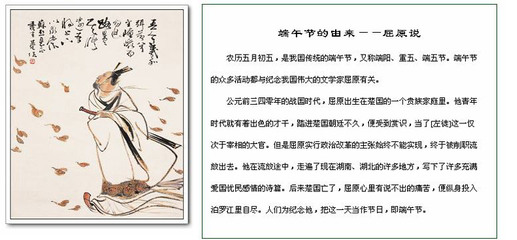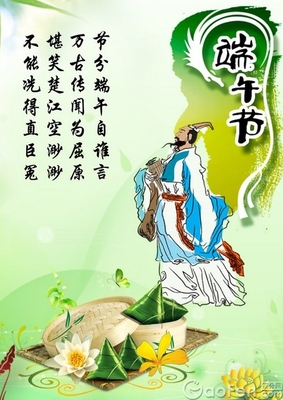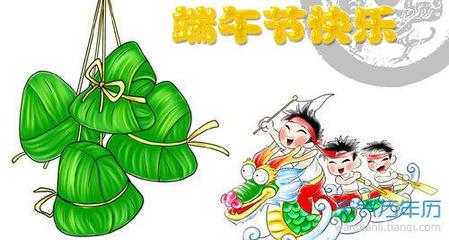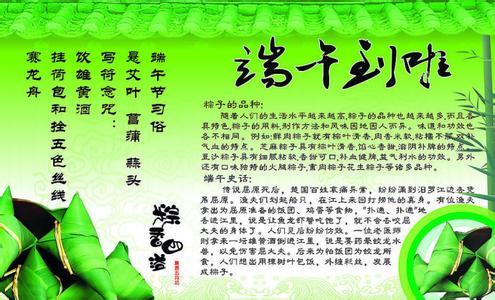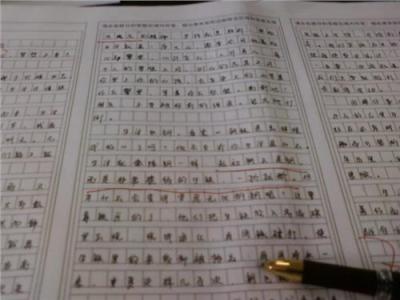端午节的来历 英文
The Dragon Boat Festival is a lunar holiday, occurring on the fifth day of the fifth lunar month
The Chinese Dragon Boat Festival is a significant holiday celebrated in China, and the one with the longest history. The Dragon Boat Festival is celebrated by boat races in the shape of dragons. Competing teams row their boats forward to a drumbeat racing to reach the finish end first.
The boat races during the Dragon Boat Festival are traditional customs to attempts to rescue the patriotic poet Chu Yuan. Chu Yuan drowned on the fifth day of the fifth lunar month in 277 B.C. Chinese citizens now throw bamboo leaves filled with cooked rice into the water. Therefore the fish could eat the rice rather than the hero poet. This later on turned into the custom of eating tzungtzu and rice dumplings. The celebration's is a time for protection from evil and disease for the rest of the year. It is done so by different practices such as hanging healthy herbs on the front door, drinking nutritious concoctions, and displaying portraits of evil's nemesis, Chung Kuei. If one manages to stand an egg on it's end at exactly 12:00 noon, the following year will be a lucky one.
Dragon Boat race Traditions:At the center of this festival are the dragon boat races. Competing teams drive their colorful dragon boats forward to the rhythm of beating drums. These exciting races were inspired by the villager's valiant attempts to rescue Chu Yuan from the Mi Lo river. This tradition has remained unbroken for centuries.
Tzung Tzu :A very popular dish during the Dragon Boat festival is tzung tzu. This tasty dish consists of rice dumplings with meat, peanut, egg yolk, or other fillings wrapped in bamboo leaves. The tradition of tzung tzu is meant to remind us of the village fishermen scattering rice across the water of the Mi Low river in order to appease the river dragons so that they would not devour Chu Yuan.
Ay Taso The time of year of the Dragon Boat Festival, the fifth lunar moon, has more significance than just the story of Chu Yuan. Many Chinese consider this time of year an especially dangerous time when extra efforts must be made to protect their family from illness. Families will hang various herbs, called Ay Tsao, on their door for protection. The drinking of realgar wine is thought to remove poisons from the body. Hsiang Bao are also worn. These sachets contain various fragrant medicinal herbs thought to protect the wearer from illness.
风俗习惯端午节最重要的活动是龙舟竞赛,比赛的队伍在热烈的鼓声中划著他们多彩的龙舟前进。这项活动的灵感是来自於当时汨罗江畔的居民,在江中 划船救屈原,而这个传统也一直保持了数个世纪。在端午节时受欢迎的食物就是粽子,粽子是以米包著肉、花生、蛋黄及其他材料,再以竹叶包裹。而粽子的传统则 来由於汨罗江边的渔夫,将米丢入江中平息江中的蛟龙,希望他们不要将屈原吃掉。农历的五月,也就是端午节的这个时节,对中国人而言,除了屈原的故事还有许 多其他重要的意义。许多中国人相信五月是一年中容易引发疾病的危险时节,因此必须有许多防备家人生病的措施。许多家庭会将一种特别的植物-艾草挂在门口, 作为保护之用,而人们也会挂带香包,它是以含有多种香味的药用植物所做成,也可以保护人们远离疾病。
Note
significant:重要的 drumbeat:鼓声,打鼓 patriotic:爱国的concoction:调和物 nemesis:报应风俗习惯
The races were very exciting because the cars were very fast and loud.那个比赛非常刺激,因为那些车子非常的快速而且大声。
competing竞争的(形容词)
All of the competing race car drivers are very skilled.所有竞争的赛车选手都有高超的技术。rhythm节奏(名词)
I like to dance to the rhythm of this music.我喜欢随著音乐的节奏跳舞。
inspire启发灵感(动词)
The beautiful scenery inspired me to write this song.这美丽的风景启发我写这首歌曲的灵感
villager村民、乡民(名词)
During our travels we found the villagers to be very friendly and helpful.在我们的旅程中,我发现乡民们非常友善及热心。
valiant英勇的(形容词)
The valiant hero saved the little girl's life.那个英勇的英雄拯救了小女孩的生命。
remain 留下、保持原状(动词)
he had completed the report.他留在办公室直到完成报告。
Tzung Tzu粽子(名词)
He ate so much Tzung Tzu that he became sick.他因为吃太多粽子而感到身体不适。
wrap包裹(动词)
She wrapped the Christmas presents with colorful paper.他用彩色的纸包裹圣诞礼物。
The man is scattering seeds on the grass for the birds to eat.那个男人将种子洒在地上给鸟吃。
devour狼吞虎咽的吃,吃光(动词)
The lion devoured the food.那只狮子狼吞虎咽的吃那些食物。
significance重要性(名词)
Do you understand the significance of this story?你知道这个故事的重要性吗?
Ay Tsao艾草(名词)
Every year my family hangs Ay Tsao on their front door.每年我的家人都会挂艾草在前门。
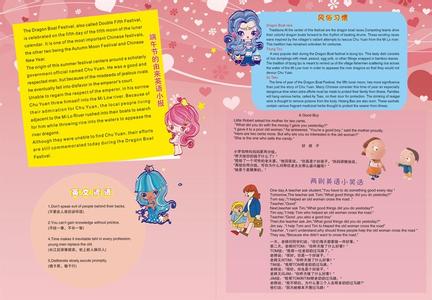
Hsiang Bao香包(名词)
The children love to collect the colorful Hsiang Bao.小孩喜欢
 爱华网
爱华网